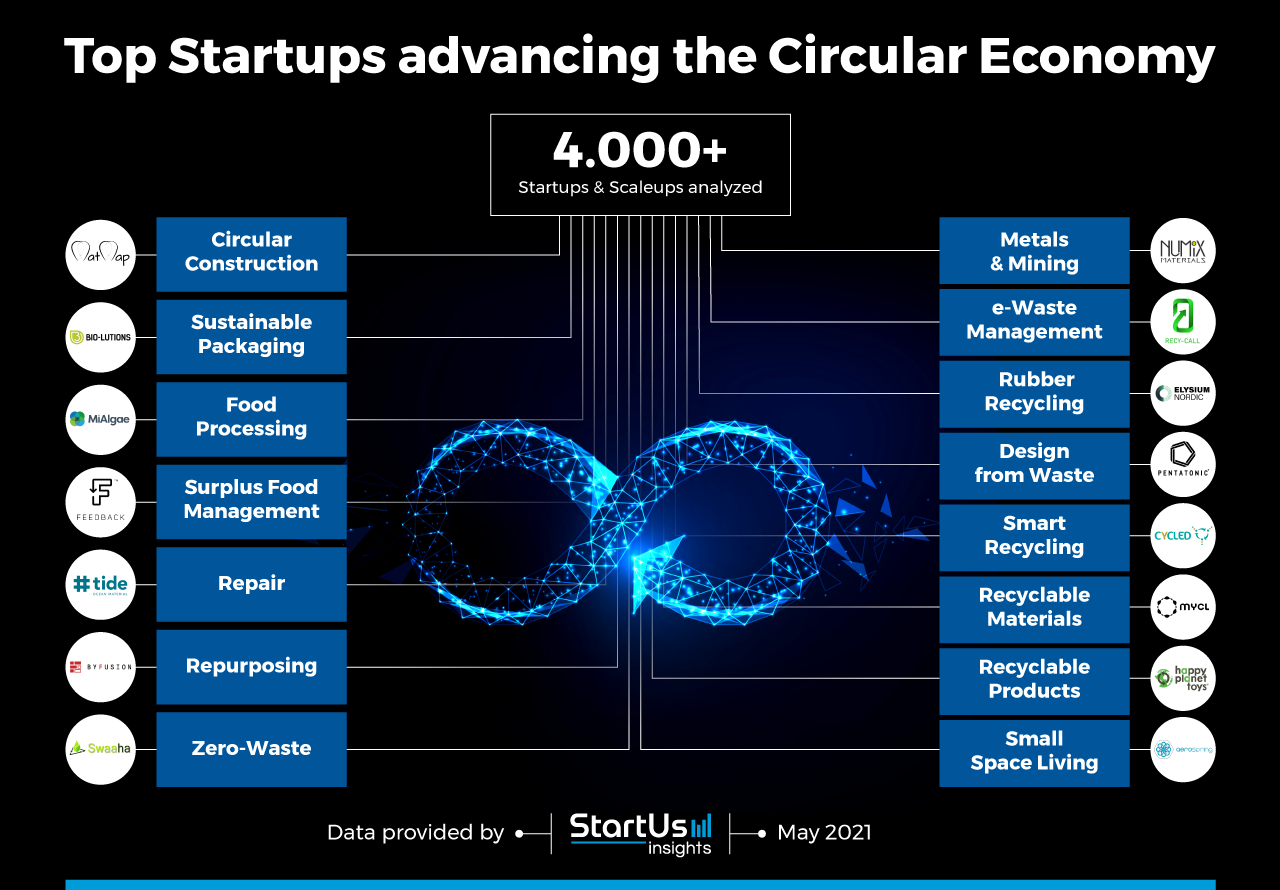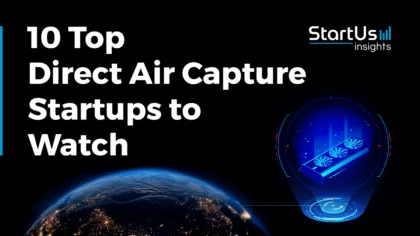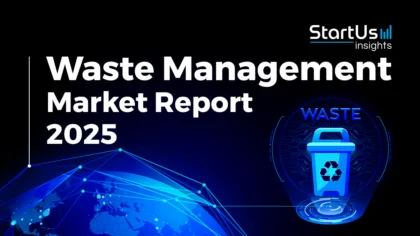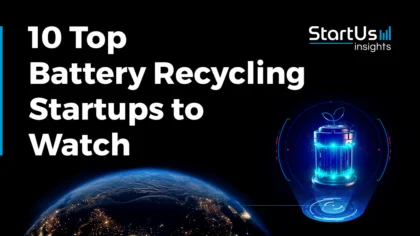Accelerate Productivity in 2025
Reignite Growth Despite the Global Slowdown
Staying ahead of the technology curve means strengthening your competitive advantage. That is why we give you data-driven innovation insights based on our analysis of 4.000+ circular economy startups & technologies. This time, you get to discover the 15 hand-picked startups enabling the circular economy.
Innovation Map highlights 15 Industries & Startups enabling the Circular Economy
For this in-depth research on the top circular economy startups, we analyzed a sample of 4.000+ global startups and scaleups. These insights are derived by working with our Big Data & Artificial Intelligence-powered StartUs Insights Discovery Platform, covering 2.093.000+ startups & scaleups globally. The platform quickly delivers an exhaustive overview of emerging technologies within a specific field as well as identifies relevant startups & scaleups early on.
In the Innovation Map below, you get an overview of the top startups enabling a circular economy across industries that impact brands and companies worldwide. The result of this research is data-driven innovation intelligence that improves strategic decision-making by giving you an overview of emerging technologies & startups enabling a circular economy.
Explore Top Circular Economy Startups
1. Circular Construction
The high carbon footprint of the construction sector largely stems from the use of unsustainable materials, transportation, and practices. Moreover, a lot of materials used in the construction sector are never reused or recycled. By implementing circular economy principles, construction companies reduce costs and also reduce their carbon footprint per project. Some circular approaches in the construction industry include:
- Natural Fiber-based Insulation Materials
- Renewable Construction Business Models
- Adaptive Modules
- Waste-to-Construction Materials
- Sustainable Construction Marketplaces
MatMap creates a Digital Ceramic Marketplace
Spanish startup MatMap provides an online marketplace for ceramic materials. It recovers ceramics from demolition sites and discontinued projects, as well as leftover items from construction projects. Recovered ceramics are reused in pavements, coatings, roof tiles, lattices, and bricks. By optimizing material use and reducing the costs of construction projects, the startup enables a circular economy in the sector.
Explore our analysis of 5 top construction startups out of 310 developing circular economy solutions.
2. Circular Packaging
The challenge for the packaging industry is to develop sustainable packaging that allows companies to remain competitive in terms of costs. Today, most packaging is designed to be used once and then discarded. With a finite number of resources to work with, manufacturers look to switch to recyclable and reusable options that benefit both consumers and the planet. Startups offer circular packaging solutions to incorporate the principles of a circular economy and integrate them with sustainable packaging. Some circular packaging solutions include:
- Packaging from Agricultural Waste & Residue
- Alternatives to Plastic Packaging
- Reusable & Returnable Packaging
- Compostable Food Containers
- Biomaterials for Packaging
Bio-lutions creates Packaging from Agricultural Residue
German startup Bio-lutions creates biodegradable material made from agricultural excess. It offers sustainable packaging and compostable tableware solutions. The packaging material is made from agricultural residues that are converted into self-binding natural fibers through a mechanical process. The raw material goes through energy-intensive processes of cellulose extraction and bleaching. This process avoids the excessive use of chemicals and water, helping reduce the overall carbon footprint. Further, the startup’s packaging is suitable for all types of wet and dry food. The startup’s products help companies shift to sustainable packaging solutions that are durable and affordable.
Discover 5 top packaging startups out of 700+ developing circular economy solutions.
3. Food Processing
Food processing generates large amounts of wastes and byproducts. Additionally, waste disposal by incineration contributes to huge amounts of carbon dioxide emissions. FoodTech startups develop sustainable solutions for the industry to reduce waste and increase resource productivity. Moreover, raw material-intensive foods, from beef to chocolates, require sustainable solutions to meet high consumer demand. Some circular economy solutions for the food processing industry include:
- Waste Valorization Solutions
- Insect-based Protein
- Cellular Agriculture
- Byproduct Upcycling
- Microalgae Production
MiAlgae produces Microalgae for Livestock Feed
British startup MiAlgae produces fatty acid-rich microalgae for sustainable livestock and pet feed. It grows algae on human-grade growth media made of co-products from the whisky industry. The startup’s fermentors provide the optimal conditions for microalgae growth. MiAlage’s zero-waste process provides microalgae rich in Omega-3 while returning clean water.
Dive into our analysis of the 5 top food startups out of 188 developing circular economy solutions.
4. Surplus Food Management
Food waste is responsible for about 7-8% of global greenhouse gas (GHG) emissions. Additionally, nearly a third of the world’s agricultural land currently produces food that is never consumed. By saving food from reaching landfills or getting burnt, startups develop platforms to prevent resulting methane emissions, while also increasing food security. Circular economy approaches help bridge the gap between the businesses that have surplus food and people suffering from hunger or malnutrition. Some examples of circular food management solutions include:
- Food Sharing Platform
- On-Demand Surplus Food Pickup
- Marketplace for Close-to-Expiration Food
- Logistics Platform for Surplus Food Management
- Access to Discounted Food from Local Restaurants
FeedBack App provides access to Discounted Food from Local Restaurants
Canadian startup FeedBack App works on a mobile platform that enables customers to rescue excess food from local vendors while saving money. In the app, users get access to hundreds of time-specific promotions at Toronto’s restaurants. Customers order food directly through the app, then arrive at a selected restaurant during the given pick-up hours and present an in-app mobile receipt to collect the ordered food.
5. Smart Recycling
Despite the fact that most products are not recycled, waste collection, sorting, and recycling centers find it difficult to manage the waste that they receive. High requirements of human labor and its associated safety concerns currently make recycling an expensive business. Startups develop a range of smart recycling solutions that employ computer vision and image recognition technology with AI algorithms. Together, such solutions aim to recycle a large portion of waste streams across industries, efficiently and profitably. A few examples of smart recycling solutions include:
- Smart Waste Collection Centers
- Smart Waste Bins
- Mineral Recycling Technology
- Concrete Recycling
- Lithium-ion Battery Recycling
CYCLED builds Smart Bins
CYCLED is a Norwegian startup building a waste management platform using blockchain-based incentives and a smart bin. In their two-pronged approach to building a circular waste management economy, the CYCLED App connects food packaging companies with recycling centers as well as consumers with recyclables collection centers. The CYCLED Smart Bin utilizes cameras and AI to automatically sort and reward people who recycle plastics, metal, and paper. The startup is looking to expand the smart bin’s capabilities to recycle glass and organics as well.
Learn more about 5 top smart recycling startups out of 827 enabling a circular economy.
6. Recyclable Materials
Plastic pollution is a major threat to ecosystems globally. Moreover, most plastic waste, such as plastic straws, is too lightweight to recycle and often ends up in oceans, where they pollute the water and hurt marine wildlife. Consequently, startups are working on new bio-based materials that are both recyclable and sustainable. The environmental benefits of such materials include energy savings and waste reduction as well as reducing carbon emissions. From clothes to everyday items, here are a few examples of recyclable materials:
- Recyclable Straws
- Sustainable Construction Materials
- Insulation Materials
- Recyclable Apparel
- Mycelium-based Materials
MyCoTech develops Mycelium-based Materials
Indonesian startup MyCoTech produces sustainable materials from mushrooms. The startup utilizes mycelium fibers to produce sustainable and recyclable materials. Through this technique, MyCoTech biofabricates Mylea, a leather alternative, from agroforestry byproducts. Further, the material has a customizable characteristic texture with a tensile strength of 1-11 MPa.
Get to know 5 top startups developing recyclable materials out of 236 enabling a circular economy.
7. Recyclable Products
From fashion, retail, and hospitality to toys and other mass-manufactured non-recyclables, industries are seeking sustainable solutions. With growing sustainability concerns, companies and consumers alike are paying attention to where daily-use products, such as furniture and clothing, are manufactured. Increasingly, consumers prefer products with a low environmental impact that are also 100% recyclable. Some recyclable products that reduce waste and enable a circular economy include:
- Hangers
- Clothing
- Furniture
- Beverage Bottles
- Toys
Happy Planet Toys creates Recyclable Toys
Australian startup Happy Planet Toys offers a range of fully recyclable toys. The toys are also made from recycled milk bottles, offering a sustainable alternative to plastic toys. The startup’s toys feature fun characters and offer functionality to encourage creative and open-ended playtime. Moreover, the toys help engage children and their families on the importance and benefits of recycling, reducing, and reusing plastic waste.
8. Metals & Mining
Cities generate tonnes of waste daily which contain large amounts of metals. Electronic gadgets, for example, utilize small quantities of precious metals such as gold, silver, palladium, and platinum. Circular economy startups offer a range of waste recycling solutions that prevent the need for virgin mining of such metals. These solutions close the loop in material use and also generate value from waste. Applications of circular metals & mining include:
- Urban Mining
- Metal Waste Recycling
- Metal Extraction
- Supply Chain Traceability
- Metal Recovery
NUMiX Materials enables Metal Recovery
US-based startup NUMiX Materials develops solutions for metal recovery from waste streams. The startup’s sorbent technology removes the concentration of toxic and precious metals from water. The high efficiency of this technology enables its use for metal harvesting. NUMix’s sorbent technology minimizes chemical requirements and simplifies operations while also reducing costs.
Explore our analysis of 5 top metals & mining startups out of 282 enabling a circular economy.
9. e-Waste Management
Increasing demand for the latest electronic gadgets leaves a trail of e-waste that is fast becoming an environmental concern in many countries. Traditional disposal methods, such as landfills, are harmful due to the non-biodegradable nature of the plastics and metals that constitute printed circuit boards. Advancements in waste processing methods enable startups to segregate and repurpose e-waste into useful products in a safe and environmentally-friendly way. Some examples of e-waste management startups & scaleups work on:
- Electrochemical Processing
- End-of-Life Electronics
- Metal Recovery
- e-Waste Refurbishing
- Data Center Decommissioning
Recy-Call builds a Circular Economy for End-of-Life Electronics
Belgian startup Recy-Call provides e-waste recycling solutions for emerging countries in Africa. The startup collects end-of-life electronics, such as smartphones, and recycles them to create value while retaining positive long-term social and environmental impact. Recy-Call’s urban mining strategies also enable green and safe job creation for waste collectors in low-income nations.
Dive into our analysis of 5 top e-waste management startups out of 78 enabling a circular economy.
10. Rubber Recycling
Reducing the energy consumption for waste rubber material recycling is increasingly a priority for industrial companies. Traditional thermal regeneration techniques leave a substantial carbon footprint, making it difficult to justify the recycling process over time. To address this challenge, startups develop several novel technologies that use lesser energy resources, as well as reduce the costs involved in recycling. Moreover, recycling end-of-life tires (ELT) allows rubber recyclers to control the final quality of the product, usually carbon black or other oils. Some sustainable rubber recycling technologies include:
- Sustainable Devulcanization Technology
- Low-Temperature Vacuum Pyrolysis
- Scrap Tire Conversion Technology
- Chemical Regeneration
- Advanced Microwave Technology
Elysium Nordic employs Advanced Microwave Technology
Elysium Nordic is a Danish startup utilizing a patented microwave technology to recover gas, steel, oil, and carbon black from ELT materials via thermal decomposition. The startup’s first plant will be built in the port of Nyborg in Denmark with the capacity to recover up to 12.000 tons of carbon black from 30.000 tons of ELT. The plant will also use recovered gas in its own processes, reducing the need for external sources of energy, as well as delivering surplus heat to the district heating network.
Discover the 5 top rubber recycling startups out of 142 enabling a circular economy.
11. Design from Waste
As waste continues to increase, major consumer product companies and brands seek to reduce their byproducts and adopt recycling or upcycling. To help with this, startups provide research and development (R&D) services to identify upcycling opportunities and strategies. This helps companies repurpose post-consumer and out-of-use materials and optimize logistics to add another revenue stream while improving sustainability. The wide range of design-from-waste solutions include:
- Wood Waste Upcycling
- Recycled Textiles
- Organic Waste Upcycling
- Upcycling R&D
- Art from Waste
Pentatonic accelerates Circular Economy Transformation
German startup Pentatonic speeds up the transformation to a circular economy. It partners with consumer product companies to design and develop new products from used materials such as textile and plastics, as well as from electronic waste. The startup works on new material recovery, circular systems design, and the discovery of new materials. Additionally, the startup works on its range of personal dining products, Otherware, designed from recycled CDs and food packaging and aimed at eliminating single-use plastics.
12. Repair
People frequently replace their electronics these days, even when their previous gadgets are still functional. The disposal of damaged electronic waste has a negative environmental impact. Moreover, the mining of rare-earth metals for use in new electronic devices further contributes to carbon emissions. This is why circular economy startups work to repair and restore electronic products. Further, startups provide solutions to extend the life cycle of electronic devices. Some applications of circular repair solutions include:
- Circular Economy for Electronics
- Repair in Retail
- Circular Fashion
- Reverse Logistics
- Repairing Degenerated Plastics
Tide Ocean Material repairs Degenerated Plastics
Swiss startup Tide Ocean Material develops waste-to-value solutions for ocean-bound plastic. It collects different kinds of plastics and converts them into #tide, a versatile granular material. The #tide granules find applications in plastic injection for the manufacturing of electronic devices, automotive parts, and other plastic products. The startup also produces #tide yarn and #tide filament for use in textiles and 3D printing, respectively.
Get to know the 5 top repair startups out of 215 enabling a circular economy.
13. Repurposing
Governments globally are embracing the concept of circular economy to fight climate change and environmental degradation across industries. Reducing the number of new raw materials and increasing the use of recycled materials reduces emissions and improves waste utilization. Moreover, repurposing reduces the need for additional power production, extends resources, and shrinks landfill waste. Hence, startups and scaleups recycle, refurbish, and remanufacture waste into viable second-life products. Some applications of repurposing include:
- Repurposing Used Batteries
- Repurposing Asphalt
- Remanufacturing Vehicle Battery Packs
- Converting Plastic Waste into Building Materials
- Carbon-Neutral Laptops
ByFusion repurposes Plastic Waste into Building Materials
New Zealand-based startup ByFusion repurposes plastic waste into building material. The startup’s flagship product, ByBlock, is created by superheating shredded plastic waste. The product finds applications in walls, sheds, privacy fencing, terracing, and landscaping. And unlike concrete blocks, ByBlock does not crumble or crack but significantly reduces carbon emissions while also being customizable to the customer’s requirements.
Explore our analysis of 5 top repurposing startups out of 501 enabling a circular economy.
14. Zero-Waste
Adopting zero waste practices demands rethinking and redesigning almost all products in daily use. Startups aid this situation by repurposing recyclable, as well as hard-to-recycle, products to create other high-value materials or products. Further, researchers estimate that the vast majority of plastics end up either in a landfill or the natural environment, with municipal solid waste (MSW) landfills containing mostly plastics. Therefore, controlling plastic production and waste stream management in factories are also priorities for implementing a zero-waste future. Some zero-waste applications include:
- Brewery Wastewater into Hydrogen
- Zero-Waste Grocery Stores
- Reverse Logistics
- Mobile Composting Vans
- Plastic-to-3D Printing Material
Swaaha manufactures a Smart Mobile Composting Van
Indian startup Swaaha builds a smart mobile composting van that collects and disposes wet wastes daily from subscribed customers. The startup’s van, Havankund, has an in-built composting system and processes up to 250 kgs of organic waste per hour. It uses the Internet of Things (IoT) sensors to calculate service charges based on the trash weight. Swaaha also offers a mobile app for customers to track their waste generation and processing quantity. The pay-as-you-go composting model is ideal for institutions lacking curing space, such as restaurants, hotels, and hospitals.
Learn about the 5 top zero-waste startups out of 329 enabling a circular economy.
15. Small Space Living
As the population in cities further increases, people seek ways to produce less waste and live more sustainably. Additionally, many people lose their financial flexibility owing to the COVID-19 pandemic, or other crises. These, and more reasons, drive people to choose smaller homes and, consequently, optimize the space available to them. Startups develop modular living solutions that allow for space maximization and decluttering, which is also affordable. Some applications of small space living solutions include:
- Flexible Furniture
- Electronics-enabled Furniture
- Vertical Aeroponics for Small Spaces
- Mini Dishwashers
- Bathroom Space Optimization
Aerospring Gardens works on Vertical Aeroponics for Small Spaces
Singaporean startup Aerospring Gardens develops vertical aeroponics systems for small-space gardening. The systems, adjustable for balconies and indoor growing, provide the plants’ roots with more oxygen than traditional hydroponics. This allows gardeners to generate high yields within a limited space. The startup’s compact system takes up 1 square meter of space but allows growers to harvest up to 27 different plants in their apartments.
Discover the 5 out of 308 top startups easing small-space living and enabling a circular economy.
Discover the Latest Circular Economy Startups
Every day, new startups and technologies emerge that advance the circular economy. These solutions span a range of industries, and emerging companies take advantage of waste streams to segregate and process wastes. Founded in 2020, Scindo is a British cleantech startup that recycles plastics that aren’t efficiently recyclable with current methods. The startup uses enzymes to convert plastics into high-value molecules for use in various industries such as chemicals, biotech, and pharma. By making plastics biodegradable, it provides an alternative to incineration and landfills, enabling a circular economy.








